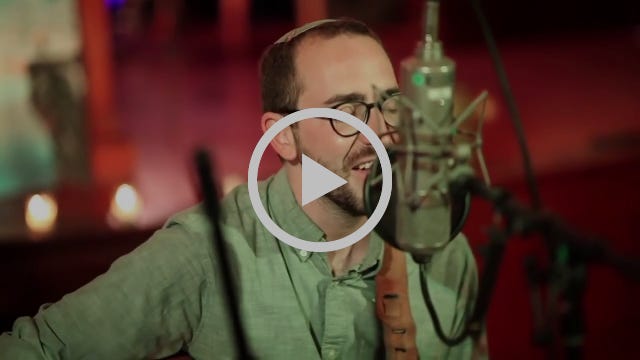Tiny Desks, Momentous Firsts, And Some Tiny Torah
Think They'd Ever Feature Aramaic on NPR?

Josh Warshawsky - Yah Ribon [NPR Tiny Desk Contest 2019]
Facing Your Fears
Dear Friends,
We've now officially released all 11 tracks from Chaverai Nevarech. I hope you've enjoyed them. Did you know there's a playlist on Youtube where you can watch them all? You can find it here. Take a watch and a listen and let me know your favorite parts!
On a related note, this week I entered Yah Ribon into NPR's 2019 Tiny Desk Contest. Each year, judges choose from hundreds of videos of musicians performing in front of tables or desks, for the chance to perform at NPR headquarters and across the country on NPR's All Songs Considered podcast! I'm pretty sure this was the first Aramaic entry in the history of the contest. I hope they like it! You can help spread the word by sharing the video, which you can find here or at the top of this email.
And I can't leave you with without sharing a little Torah, especially on the anniversary of my Bar Mitzvah (Shemini!). An interesting thing happens towards the beginning of this week’s parasha.
ויאמר משה אל אהרון, קרב אל המזבח ועשה את חטאתך ואת עלתך, וכפר בעדך ובעד העם… (ט':ז')
"Moshe says to Aharon, approach the mizbe’ach and make your sin offering and your Korban offering, and atone for yourself and for the entire people (Vayikra 9:7).”
This word, “Krav,” “Approach,” is confusing to the rabbis. After all of the instructions for chapters and chapters about the Tabernacle, why does Moses now have to tell Aaron to come forward? Rashi (1040-1105) explains that Aaron was embarrassed and frightened to approach the tabernacle, and Moses said to him, “Why are you embarrassed? For this you were chosen.” “Lekach nivcharta.” The Ba’al Shem Tov (Founder of Hasidism, 1698-1760) explains that it is exactly BECAUSE Aaron has humility, fear, and embarrassment in putting himself in this leadership position that he was chosen, because of this deep humility at the magnitude of this responsibility of representing and atoning for the people.
Another commentary (Minchah Blulah, Avraham Menachem Rapoport, 1520-1596 Italy) explains that when Aaron looked at the tabernacle, he saw the Golden Calf, and that was why he was frightened. The imagination expands and manipulates all of our deepest fears and brings them out. Aaron could never get the sin of the Golden Calf out of his mind, and it paralyzed him.
Isn’t that a familiar feeling? So often we get stuck in our past mistakes, not knowing how to move forward. This is exactly what this first psalm in Kabbalat Shabbat reminds us of. Al takshu levavchem kimriva, arba’im shana akut bedor, va’omar am to’ei leivav hem. Don’t harden your heart like you did in the desert. For forty years this generation wandered, and God said, “they are a confused people!” Oh we are. We are. But that’s why this psalm comes first, just as we’re preparing to enter Shabbat. We have to find a way to face our fear, to let it go, even if just for a moment. Hayom, im b’kolo tishma’u. Today, if only we can hear the voice. As we enter Shabbat this week, take a moment to think about the mistakes and fears of the past week (who hasn’t had them?) and face them, so that we don't make them again.
And if you happen to be in the Boston area, come join me at Temple Israel of Natick!
Shabbat Shalom,
Josh


